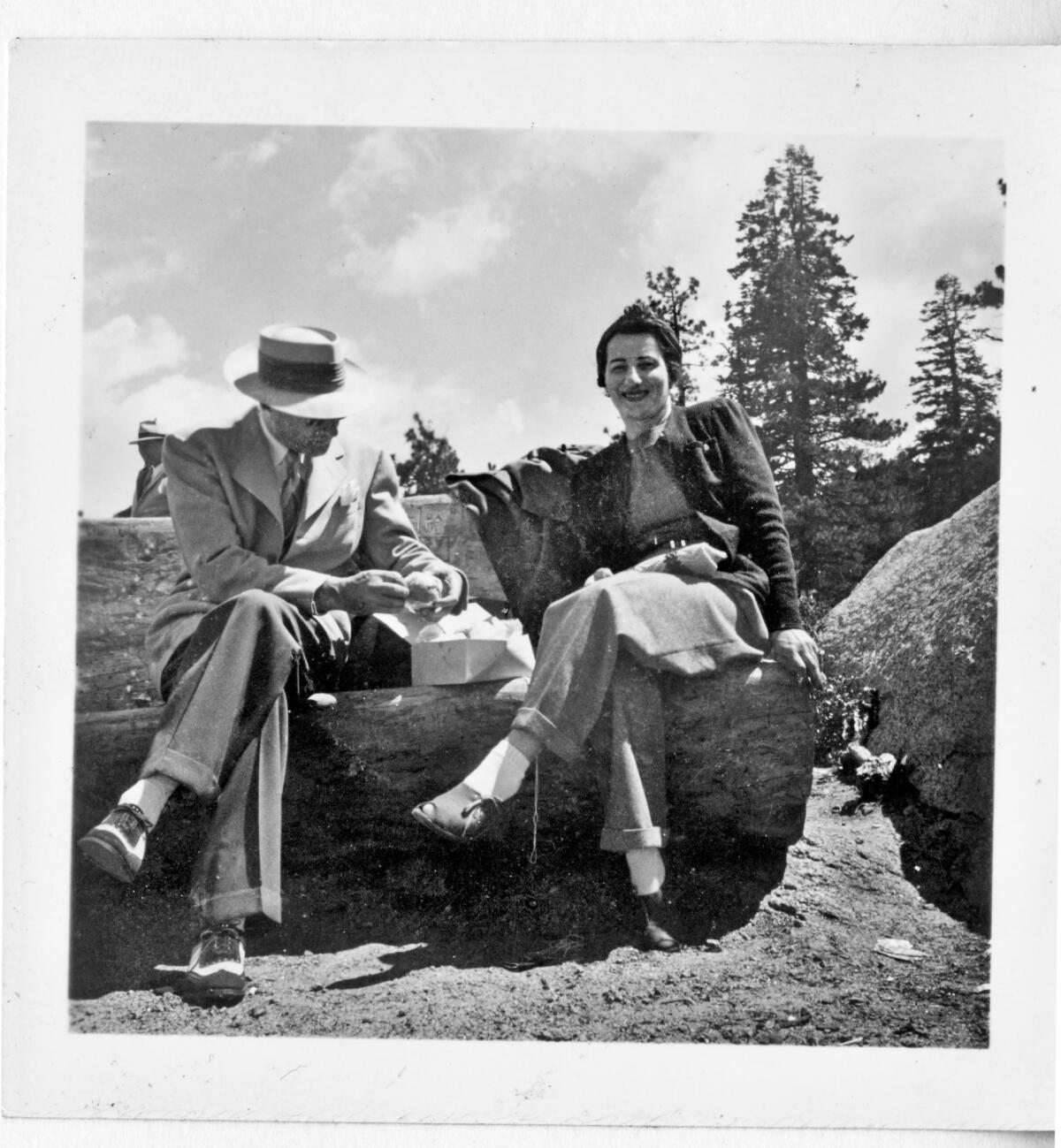Growing up in an L.A. mansion that time forgot: Kathryn Harrison’s ‘On Sunset’
- Share via
The past is, depending upon whom you ask, either "prologue," "a foreign country" or "never dead. It's not even past." (In this case, William Shakespeare, L.P. Hartley and William Faulkner, respectively).
All memoirs are, by definition, collections of the past, but few interrogate it quite like Kathryn Harrison's "On Sunset." What sets Harrison apart is that the past was her native land, even as she was living it. Raised by a pair of deeply eccentric old-world grandparents in a sprawling house on Sunset Boulevard, Harrison existed in a childhood out of time and place, seemingly unbound from her era.
Although the book is largely set in 1960s Los Angeles, spanning the years from Harrison's birth in 1961 to the 1971 sale of the house, there is little sense of the outward time period. Instead, Harrison and her caregivers are given over to a kind of folie à trois of condensed, collective memory. Her grandparents’ bygone worlds permeate, pervade and play concurrently with hers, like two movies projected on a wall at once.
Harrison is taught to curtsy and is administered cod liver oil "and other torments generally imagined to be reserved for children left behind in a previous century." Carbonated beverages, chewing gum and nail polish are verboten. She fails invisible tests at school with her cultural ignorance; she doesn't know who the Doors or the Monkees are, but she can sing the popular songs that her great-aunts Belle and Violet once crooned in London music halls.

Harrison, who has written numerous novels, is perhaps best known for her memoir "The Kiss," which detailed a multi-year incestuous relationship with her father that began when she was 20. The book caused quite a stir when it debuted in 1997. "To call it controversial would be a laughable understatement; it has been the object of almost apoplectic fury," this paper wrote at the time of its release. Though knowledge of these eventual events is difficult to entirely push out of any narrative of Harrison's life, she makes no mention of them in "On Sunset." The father in question is mentioned only a handful of times here, and never in any detail.
Her teen mother is also largely absent, though her presence looms as she abruptly careens in and out of the picture. It's Harrison's maternal grandparents, both of whom had already clawed their way through several theatrical acts before meeting each other in Los Angeles in the 1940s, who occupy the heart of the story. Harry Jacobs, her grandfather, left London for British Columbia and then Alaska, moving west in various makeshift, adventuresome jobs. Reared in the walled luxury of Shanghai’s International Settlement and later the South of France, Harrison's grandmother Margaret Sassoon “transplanted her life from Europe — touring the Alps, stopping at Lake Como, taking a jaunt to the Jungfrau — to a new continent, a state that fulfilled its golden promise.”
The Sassoons were a family of tremendous wealth, albeit of the bygone, once-upon-a-time variety. Described as "the Rothschilds of the East," the sprawling clan of Baghdadi Jews had, at one point in the 1880s, an estimated "70 percent control of the world's opium trade." The jig, however, was almost entirely up by the time baby Harrison came into the picture. The family was rapidly teetering into what Harrison describes as a “schizophrenic” financial collapse. Sassoon, who once spurned princes as suitors, now collects books of Blue Chip trading stamps to stave off bankruptcy. Treasured heirlooms continually disappear from the walls, even as the family sleeps on hand-finished and monogrammed bedclothes made to order from Grande Maison de Blanc and as Harrison wears satin-smocked Sunday school dresses from a store on Rodeo Drive.
The book largely unfolds in short vignettes, rarely longer than a few pages at a time. Personal narrative commingles with family history. We hopscotch from the house on the periphery of Bel-Air to an array of exotic locales: the mythic realm occupied by Sassoons of generations past; cloistered Shanghai and the glamour of Cap-Martin overlooking the Mediterranean Sea; the soot and fog of turn-of-the-prior-century London, where her grandfather's mother ran a boardinghouse; and the raw wildness of work on the Alaskan railroad. There are occasional interwoven snippets from archives and diary entries, but most of the past is unspooled through Harrison's hunger for memory, pulled loose as she prompts her grandparents to re-tell stories from her favorite bits.

Those expecting a reverie of bygone Los Angeles will likely be disappointed. Sure, there are avocado trees, visits to the La Brea Tar Pits and other salient references, but despite its title, the book never feels particularly rooted in the city itself, let alone Sunset Boulevard. Shanghai and Alaska are portrayed far more vividly than Southern California.
The family history is undeniably rich, and there are moments of great vibrance, but the passages sometimes slip into tedium, like being asked to flip through someone else's heirloom photo album for the second or third time. The incantation of names and places grows old, and the reader can feel a bit like a ping-pong ball, pulled through time and space without any particular sense of overarching narrative motion.
But Harrison is nothing if not a magnificent writer, and there is something deeply satisfying about her sentences. A kind of internal rhythm dictates, with utmost precision and nary a stray adjective. She has a knack for layering stacks of images, details and exact snapshots into place, separated by commas like beads strung into a kind of rhapsody. Each sequence is beautifully rendered, even if it doesn't always feel like an insistent piece of a larger whole.
Julia Wick is the former editor-in-chief of LAist.com. She writes about cities, culture and all things Los Angeles.
::
Kathryn Harrison
Doubleday: 288 pp., $27
Sign up for our Book Club newsletter
Get the latest news, events and more from the Los Angeles Times Book Club, and help us get L.A. reading and talking.
You may occasionally receive promotional content from the Los Angeles Times.








